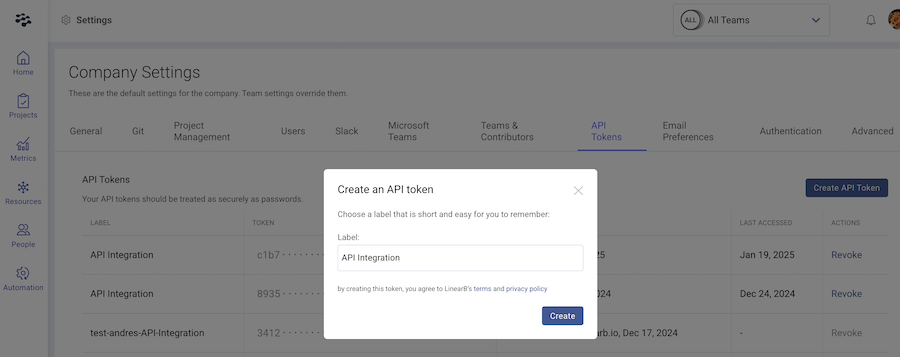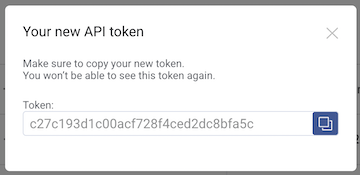Table of Contents
Generating a LinearB API Token
LinearB enables you to: Track deployment times via API calls from your CI/CD system. Report incidents to measure metrics such as MTTR (Mean Time to Recovery) and CFR (Change Failure Rate) more accura…
Updated
by Steven Silverstone
LinearB enables you to:
- Track deployment times via API calls from your CI/CD system.
- Report incidents to measure metrics such as MTTR (Mean Time to Recovery) and CFR (Change Failure Rate) more accurately.
- Import custom metrics or export LinearB data using the LinearB API.
API Documentation: LinearB API Overview
Follow the steps below to generate an API token. If you intend to track release stages, ensure the optional preparation steps are complete.

Preparation for Release Tracking (Optional)
If you're using the token to track releases:
- Enable API Integration for Release Detection:
- Navigate to Company Settings > Advanced.
- In the Releases Detection section, select the API Integration option. If the API Integration option is missing, contact support@linearb.io to upgrade or enable the feature.
- Multi-Stage Deployment Tracking:
- The UI supports generating a token for the final release stage.
- To track multiple stages (e.g., QA, staging), reach out to support@linearb.io for a multi-stage detection strategy.

Steps to Generate an API Token
- Navigate to Company Settings > API Tokens.
- Click the Create API Token button, a popup window opens with your new key.
Each customer can create up to 20 API tokens through the UI. If you require more, please contact support.
- Choose a short label for the API Token, and click Create.

- Copy the token immediately. This is the only time it will be visible.

Once generated, the token can be installed in your CI/CD system to notify LinearB when code is deployed. For detailed implementation guidance, refer to the Multi-Stage Delivery API.

Updating or Revoking an API Token
- Visibility: Tokens are only visible when first generated. If you lose the token, you will need to revoke and generate a new one.
- Revoking a Token:
- Go to the API Tokens tab.
- Click Revoke next to the existing token.
- When prompted, click Yes, revoke token.

- Generating a New Token: Follow the steps in the "Steps to Generate an API Token" section to create a replacement token.
How did we do?